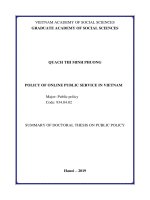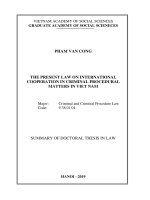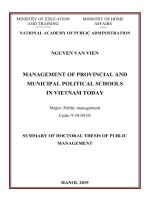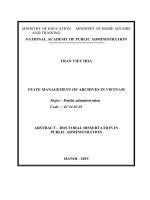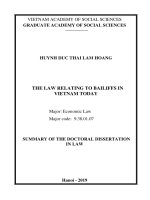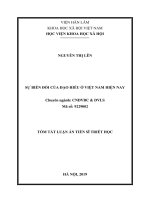Sự biến đổi của đạo hiếu ở việt nam hiện nay tt tiếng anh
Bạn đang xem bản rút gọn của tài liệu. Xem và tải ngay bản đầy đủ của tài liệu tại đây (293.13 KB, 27 trang )
VIETNAM ACADEMY OF SOCIAL SCIENCES
GRADUATE ACADEMY OF SOCIAL SCIENCES
NGUYEN THI LEN
THE CHANGES OF THE HIEU IN VIETNAM TODAY
Major: Dialectical materialism and historical materialism
Code: 9 22 90 02
SUMMARY OF THESIS DOCTORAL THESIS
HA NOI, 2019
THIS WORK IS COMPLETED AT
GRADUATE ACADEMY OF SOCIAL SCIENCES
MENTOR: Associate Professor. Dr. Nguyen Thi Tho
Reviewer 1: Assoc.Prof.Dr. Nguyen The Kiet
Reviewer 2: Assoc.Prof.Dr. Pham Van Nhuan
Reviewer 3: Assoc.Prof.Dr. Nguyen Tai Dong
The thesis is defended before the thesis appraisal board of the
Academy at the Graduate Academy of Social Sciences at:
......hours, date ......... month...... 2019.
This thesis can be found at:
- Library of Graduate Academy of Social Sciences
- National Library of Vietnam
LIST OF PUBLISHED ARTICLES AND WORKS
RELATED TO THE THESIS
1. Nguyen Thi Len (2016), "Educating the traditional ethical values of
the nation for the young generation" - Journal of Theoretical Education
No. 242.
2. Nguyen Thi Len (2017), "Educating the word" Hieu "- important
content of family ethics education" - Education Magazine, special
issue, period 2 October.
3. Nguyen Thi Len (2018), "Filial piety and filial piety education for
the young generation today" - Journal of Education, special issue, term
1 May.
4. Nguyen Thi Len (2018), "The main factors affecting the change of
filial piety in Vietnam today" - Journal of Human Resources for Social
Sciences, September.
5. Nguyen Thi Tho, Nguyen Thanh Binh, Pham Thi Khanh, Nguyen
Thi Len (2018), "Vietnamese Family - Change from Tradition to
Modernity" - Research on Humanities and Social Sciences, ISSN
2224-5766 (Paper) ISSN 2225-0484 (Online) Vol.8, No.14.
PREAMBLE
1. The urgency of the topic
Hieu is a common ethical category associated with the existence and
development of human society. The practice of filial piety is the sacred
duty of children to repay the parents' deep gratitude for birth and nurture; it
is the practice of the gift of gratitude which has been formed and handed
down in the history of each nation. Hieu was especially appreciated by
Vietnamese people, raised to become a religion - filial piety, piety. Filial
piety is not only a moral standard, a precious tradition respected and
upheld by all people, but also become a principle and action of children
towards their parents.
As a core ethical value, filial piety endures with the development of
the nation. However, as a part of social consciousness, filial piety is also
influenced and determined by social existence and change and change of
social life. Since the country underwent comprehensive renovation,
Vietnamese filial piety has been changing in both directions: positive and
negative. On the positive side, children have better perceptions and
economic conditions for filial piety; but in the negative direction, the
phenomenon of children neglecting, neglecting, not fulfilling their
obligations to their parents, even children being mistreated, envious of one
another, pushing parents into the situation of "not eating is sick then
skinny / eat, tears full of rice bowl "still going on. Besides, in the context
of globalization and international integration today, the change of filial
perception and filial practice of some children in society today also raises
significant issues. to ponder. From the above changes, the analysis of the
1
current situation and understanding the causes of filial piety to propose
solutions are requirements in developing filial piety in Vietnam today.
That is why the PhD student chose the topic "The transformation of filial
piety in Vietnam today" to study in his doctoral thesis in philosophy; This
is also a small contribution to the implementation of the task of building a
life and spiritual culture in general and filial piety in particular in Vietnam
today.
2. The purpose and research tasks of the thesis
2.1. Purpose
Based on clarifying the theoretical issues about filial piety and the
change of filial piety in Vietnam, the thesis analyzes the current state of
filial piety in Vietnam and its causes; From there, propose several
solutions to build filial piety in Vietnam today.
2.2. Mission
To achieve the above purpose, the thesis performs the
following tasks:
- Overview of the research situation related to filial piety and the filial
piety transformation in Vietnam.
- Clarify some theoretical issues about filial piety and the
transformation of filial piety in Vietnam.
- Analyzing the changing status of filial piety in Vietnam today.
- Proposing some solutions to promote positive change, overcome
negative changes of filial piety in Vietnam today.
3. Research subject and scope
3.1. Research object
2
The thesis studies the change of filial piety in Vietnam.
3.2. Research scope
The thesis focuses on studying the change of filial piety in
Vietnam today in two aspects of positive change and negative
change. In time, the thesis mainly investigates the changing status
of filial piety since the country conducted the renovation process in
1986 up to now.
4. Theoretical basis and research methods
4.1. Rationale
The thesis is made based on the views of Marxism - Leninism, Ho
Chi Minh thought; Party views, policies and laws of the Vietnamese State
on culture, morality, and filial piety. In addition, the author inherits a
number of published research results that are directly related to the topic.
4.2. Research methodology
The thesis uses the research methodology of dialectical materialism
and historical materialism, at the same time, it combines the use of
historical - logical, analytical - general methods, compared to compare,
collate, etc. to unravel the research.
5. New contributions of the thesis
- Contribute to further clarify the theoretical issues about filial piety
and the transformation of filial piety in Vietnam.
- From analyzing the changing status of filial piety in Vietnam
today and its causes, the thesis proposes a number of solutions to promote
positive change, overcome negative changes in filial piety construction. in
Vietnam today.
3
6. Theoretical and practical meanings of the thesis
6.1.Theoretical significance
The thesis has recommendations for preserving and developing
filial piety in Vietnam today.
6.2. Practical significance
The research results of the thesis can be used as references, serving
the research and education of filial piety, ethics, and family morals.
7. The structure of the thesis
In addition to the introduction, conclusions, list of references and
list of published scientific works of the author related to the thesis, the
content of the thesis consists of 4 chapters and 13 periods.
CHAPTER 1
OVERVIEW OF THE RESEARCH SITUATION
RELATED TO THE TOPIC
1.1. Studies related to filial piety and filial piety in Vietnam
Hieu is a basic moral value of man and man. In Vietnam, from the
beginning of the twentieth century, many books of famous researchers
mentioned and discussed filial piety, such as Confucianism by Tran Trong
Kim, Confucianism published by Phan Boi Chau. In the 90s of the
twentieth century, some works such as "Confucianism of ancient times
and present" by author Quang Dam, "Confucianism and development in
Vietnam" by Vu Khieu; "Some issues about Vietnamese Confucianism"
by Phan Dai Doan, "Coming from the tradition" by Tran Dinh Huu and
"The value of traditional Vietnamese spirit" by Tran Van Giau.
4
In recent years, some books such as "Hiếu Hiếu" from the researcher
Hanh Hương, "Hiếu Hiếu's past and present" author Cao Văn Cang, "The
Filial piety and national lifestyle" of meditation Thich Giac Hanh, "The
value of traditional and transforming Vietnamese culture" by Ngo Duc
Thinh, The current ontology of filial piety in Vietnam is now edited by
author Nguyen Thi Tho.
Along with the books of domestic researchers, discussing filial piety
and filial piety in Vietnam can also include a number of books by foreign
researchers, such as: "Confucianism with China today. ”By author Vi
Chinh Thong; "The word Hiếu in Chinese culture" by Tieu Quan Trung;
"Filial piety in Confucianism" by author Cao Vong Chi; Sato Thuy Uyen's
article "Examining the text of the amendment of the twentieth-century
tales of the meaning of the song and the script of Nom" by Thuy Uyen
Besides the books, there are also articles such as "Vietnamese filial
piety through a modern perspective" by Tran Nguyen Viet; the article
"The filial piety and customs of worship of Vietnamese"; "The filial piety
in the present Vietnamese family" by Tran Dang Sinh ...
Thus, surveying the research works on filial piety and filial piety in
Vietnam, we found that the authors gave commentary on filial piety, its
formation and expression in social life in Vietnam. These studies have
helped graduate students have a relatively comprehensive and insightful
view of filial piety in general and filial piety in Vietnam in particular.
5
1.2. The research works related to the change of filial piety in
Vietnam today
Regarding the transformation of filial piety in Vietnam, one can
include the lecture "Ethics and Ethics of East and West" by Phan Chau
Trinh; "Hieu" and building filial piety in our society today "by Nguyen Tai
Thu; "From traditional filial piety, thinking about filial piety today" by
Nguyen Thi Tho ... The authors have made a quite profound analysis of
the changes of morality, morality and filial piety in Vietnam. At the same
time, the current emphasis on building morality and filial piety of Vietnam
must be done on the basis of selectively inheriting the values of morality
and morality in traditional Vietnamese society.
In the book of filial piety in Vietnamese social life today,
(Proceeding of the conference), there are many research articles reflecting
the change of filial piety, such as: "The changing trend of filial piety in
Vietnamese families now ”by Hoang Thuc Lan; "The negative effects of
market economy on filial piety in Vietnam today" by Nguyen Thu Nghia.
The current Social Essay on filial piety in Vietnam, edited by author
Nguyen Thi Tho, is an overview of the impact of the market economy on
filial piety in a positive and negative direction.
These documents have suggested, providing graduate students with
multi-dimensional perspectives, important practical knowledge, which is
the basis for the author to study in-depth the current status of filial piety in
Vietnam more objective and profound.
6
1.3. The research works related to solutions to build filial piety in
Vietnam today
The current Vietnamese filial piety needs to be built on the basis of
promoting the good moral and ethical values of the old society combined
with acquiring progressive values in Western morality and current family
culture...This is reflected in Phan Chau Trinh's books and articles: "Ethics
and morals of East and West" by Phan Chau Trinh; "Traditional style" of
Pham Con Son; "The virtue of old and present" by Cao Van Cang;
In the book "Vietnamese family culture," author Vu Ngoc Khanh
called on, it is time to "reiterate family culture", build (or restore) family
culture. The solution to this problem is not only to eradicate individualism
and promote gratitude, but the author requires family members to have an
"art of living".
Author Cao Thu Hang in the article "Some solutions to improve the
filial role in the market economy in Vietnam today" outlined four basic
solutions. According to the author, the solutions must be combined and
implemented in a synchronous manner to bring about high efficiency for
enhancing the pious role in the market economy in Vietnam today.
Thus, talking about the solution to build filial piety in Vietnamese
society, there have been a number of articles and studies mentioned.
Although these solutions have just stopped at calling for corrections and
rebuilding filial piety in the family, it has helped PhD students have
directions in proposing solutions to build filial piety in our country. The
current.
7
1.4. Overview of the research results of published scientific
works and issues that need further research in the thesis
Through surveys of research works related to the change of filial
piety in Vietnam, we can now see:
Firstly, to a certain extent, some common theoretical issues of filial
piety have been raised by the researchers and explained at different angles.
Secondly, regarding the change of filial piety, the studies have
affirmed that filial piety in Vietnam is currently transforming. However,
there has not been any research work to investigate and analyze the
changing status of filial piety in Vietnam today. There is a space for
graduate students to explore in their thesis.
On the basis of inheriting the research results of the authors, the
thesis continues to deploy, the study clarifies the following issues:
1. Some theoretical issues about filial piety and the transformation of
filial piety in Vietnam.
2. Current situation and changing causes of filial piety in Vietnam
today.
3. Some solutions to promote positive changes, overcome the
negative changes of filial piety in Vietnam today.
Conclusion of chapter 1
Hieu is a common ethical category associated with the existence
and development of human society. Especially in Eastern countries,
including Vietnam, filial piety is defined as a core ethical value, a standard
for assessing the quality and personality of a human being. Therefore, the
issue of filial piety in general and filial piety in Vietnam in particular was
8
discussed by researchers early on. Many books and articles have
approached and analyzed filial piety at different angles. Regarding the
thesis topic, the author reviews the research works on three basic groups:
Firstly, the research works related to filial piety and filial piety in Vietnam;
secondly, research works related to the change of filial piety in Vietnam;
Thirdly, the research works related to filial piety solutions in Vietnam
today. On the basis of an overview of the research works related to the
topic, the author also pointed out the issues that need further study in the
thesis, namely: clarifying some general theoretical issues about filial piety
in Vietnam. Male; assess the changing status of filial piety in Vietnam
today; From there, propose some basic solutions to promote positive
changes, overcome negative changes of filial piety in Vietnam today.
CHAPTER 2
SOME THEORETICAL ISSUES OF FILIAL PIETY
IN VIETNAM
2.1. Filial piety and the establishment of filial piety in Vietnam
2.1.1. Filial piety
Based on the concept of "filial piety" and "piety", the dissertation
determines that "filial piety" is the virtue of being a child, the moral
standards, the principles of conduct that children make towards their
parents.
2.1.2. Establishment of filial piety in Vietnam
2.1.2.1. Economy, indigenous culture
Filial piety is an ethical category, belonging to a form of social
consciousness, so the formation of filial piety is also subject to the
9
regulation of social existence. Filial piety in Vietnam is formed on the
basis of wet-rice agriculture, village structure and indigenous culture.
2.1.2.2. Influence of filial piety in Confucianism, Buddhism and
Christianity
Confucianism, Buddhism and Christianity are the major religions
in the world. Although there are differences in doctrine, canon law, and
rituals, religions meet in filial piety. When introduced into Vietnam, it
merged with the indigenous culture, supplemented, developed and
deepened, forming Vietnam filial piety with its content and characteristics.
2.2. Basic content and role of filial piety in social life
2.2.1. Basic content of filial piety in Vietnam
2.2.1.1. Caring for and caring for parents
Vietnamese filial piety identifies, cares for and takes care of parents
is the duty and responsibility of their children in repayment of their
parents' birth and nurture. Caring for and caring for parents requires their
children to do it with both love and respect.
2.2.1.2. Respect, obey your parents, inherit and promote the will of
ancestors, make the family and lineage honor
Vietnamese filial piety emphasizes that children should listen to
their parents, but not all are the most obedient. What parents teach right
must follow, what parents are not right to intervene, analysis for parents to
understand.
In filial piety in Vietnam, children must study hard, uphold the
family tradition and brotherhood. When growing up, along with making a
10
career, making a name for parents, children have to get married, have
children to continue the ancestral lineage.
2.2.1.3. Careful funeral, worship when parents passed away
In Vietnamese society, when parents passed away, the organization
of funerals must follow specific rituals, in accordance with local customs
and national traditions. The worship of ancestors, grandparents, and
parents after death is an indispensable ritual in Vietnamese families. It
expresses deep gratitude for the parents, grandparents and ancestors.
2.2.2. The role of filial piety in social life
2.2.2.1. The role of filial piety in perfecting personal morality
When practicing filial piety, both parents and children must make
efforts, try to recognize and adjust from speech to behavior. Parents must
be aware of their responsibilities in raising children to be filial children in
the family and good citizens of society. Children have to listen to their
parents' teachings, to live filially, to take care of and care for their parents
while they live and to worship their parents when they have passed away.
Filial piety becomes the root to help each person improve his morality and
rise to stand firm against the effects of society.
2.2.2.2. The role of filial piety in building family morality
The family with three main relationships is "father - son", "brother sister", "husband - wife". The intrinsic relationship of the family based on
a moral basis is mainly "filiality, meaning, affection", in which filial piety
is the basis and basis for building family morality and other relationships.
The role of filial piety in building family morality is shown in the fact that
filial piety contributes to building relationships and stipulating behavioral
11
norms in family relations and is also the basis for building solidarity
among the cities. members, against the unethical phenomena in the family
and clan.
2.2.2.3. The role of filial piety in strengthening social morality
The family is the cell of society, filial piety is the foundation of
family morality. Want to "rule the country" must "pay the country", want
"the country" must pay special attention to filial piety. Because filial piety
is the root of moral virtue, when people are filial, they will have many
other good qualities. Warm family, harmonious brothers, filial
descendants are the basis for building a peaceful society. Therefore, in
every society from the past until now, filial piety has always been
determined as a basis to protect the family foundation and establish
discipline and social stability in the spirit of humanity.
2.3. Concept and characteristics of filial piety change in Vietnam
2.3.1. Concept of filial piety change
From the concept of "change" and the reality of changing
Vietnamese society in all aspects of social life in the past, the thesis
introduces the concept of filial piety in Vietnam, which is the process of
transformation. content, form and manner of traditional filial piety on the
basis of reflecting the changes of current socio-economic conditions in
different directions.
2.3.2. Characteristics of filial piety change in Vietnam
Filial piety is a moral category, belonging to a form of social
consciousness - moral consciousness. Therefore, the change of filial piety
also obeys the law of morality mobilization and development. From that
12
general, the transformation of filial piety can be generalized in the
following characteristics: Firstly, the content transformation of filial piety
obeys the change of social existence. Second, the conversion of filial piety
obeys the law of inheritance in the development of morality. Third, filial
piety follows the law of moral progress in history. Fourthly, the
transformation of filial piety depends on the content of norms and is
associated with human activities.
Conclusion chapter 2
Filial piety is a good moral value of Vietnamese people in particular
and humanity in general. As a moral category, filial piety is formed on the
basis of social existence and reflects social existence in certain historical
periods. Filial piety in Vietnam is formed on the basis of small-scale
economy, village structure and indigenous culture with the continuation of
imported cultural values.
Vietnamese filial piety is studied in many dimensions with very rich
content, but throughout and the most essential are still three contents:
caring and nurturing parents with respect; respect, obey their parents,
make efforts to study, train, preserve their families and improve
themselves to honor their family and lineage; caring for his funeral,
worshiping and taking care of the grave when his parents passed away.
Over time, despite certain changes due to the change of social existence,
but in any age, filial piety is respected and always affirmed its role in the
perfection of virtue. personal ethics, building family morality and
strengthening social morality.
13
CHAPTER 3
THE CHANGE OF FILIAL PIETY IN VIET NAM
CURRENTLY - CURRENT SITUATION AND CAUSES
3.1. The changing situation of filial piety in Vietnam today
3.1.1. The transformation of filial piety in a positive way
Firstly, the phenomenon of violence, abandonment of children,
pushing the responsibility to care for and care for parents appears more
and more.
In today's Vietnamese society, when socio-economic conditions
change, the standards and requirements of filial piety in the care and
nurture of parents also have certain changes. In addition to having children
nearby, often caring for and caring for their parents, now the model of
hiring maids to take care of parents or sending parents to nursing homes,
although there are many controversies, is still being The association
recognizes and considers it an ethical act of a filial son.
In the current Vietnamese filial piety, assigning tasks and requiring
children to look after and care for their parents is no longer so strict and
pseudo as in traditional Vietnamese society. The way to take care and
nurture is also more diverse and richer to achieve the ultimate goal of
being happy parents, enjoying old age under the love and respect of
children.
Secondly, the phenomenon of children belittling, disobeying their
parents, not trying to study, train, chasing a selfish, pragmatic lifestyle,
falling into social evils that disgrace families and lineages tended to
increase.
14
In the current Vietnamese filial piety, most children have the attitude
of reverence and obedience to their parents. Because society promotes
democracy and equality, it is required that children respect and obey their
parents no longer be so rigid and harsh as in traditional Vietnamese
society. Today, many families and parents have listened to their children's
opinions and aspirations, shared with their children the joys and sorrows,
and empowered children to choose careers and friends, including deciding
on a partner.
In today's Vietnamese family, in return for the gratitude of their
parents, most of their children are striving to learn and practice, overcome
all difficulties and temptations in life in order to establish themselves and
establish a business. In addition to the purpose of bringing joy and pride to
parents, it is also the basis for each child to prepare himself for his future
in the future.
Thirdly, the phenomenon of children with artificial ideologies,
interests in funeral organization, worship of parents after their death has
increased.
In traditional Vietnamese society, the funeral arrangements for
parents at their death are organized according to very strict and
cumbersome rituals. Today, the Party and the State's interest in the
direction of building a cultural and ethical life has contributed to pushing
back the backward customs while ensuring respect, solemnity, and
thoughtfulness when funerals for grandparents and parents at death.
In the current Vietnamese society, the practice of filial piety in the
family must be associated with building a community of cultural residents
15
in order to preserve and promote the beauty of family culture and lineages
and at the same time contribute to building the society. stable, sustainable
development, towards building a humane and humane social community.
3.1.2. The transformation of filial piety in the negative direction
Firstly, the care and care for parents are being neglected, overlooked
by some people, even with acts of violence, mistreatment and
ungratefulness.
In today's society, besides the children who are always dedicated to
their care and worship their parents, there are still some children who are
resorting to reasons or difficulties that are negligent, overlooking the care
and nurture parents; even acts of violence, mistreatment, and ungrateful
towards parents.
The violence of children towards their parents includes physical
violence, economic violence and emotional violence. Although it is not a
common phenomenon in society, it is putting filial piety on a red alert,
which requires that we take it seriously to offer a remedy.
Secondly, many children not only do not make efforts to study, train,
preserve their families, improve themselves to honor their family and
lineages, but also fall into social evils that hurt their parents.
In today's society, besides the children who are constantly trying to
study and train themselves to make a career and to please their parents,
there is still a part of their children who are not diligent in their study and
passion. play, alcohol, gambling make parents worry and worry. A part of
the children is having misleading orientations, running the selfish lifestyle,
falling into social evils, when being discovered, being imprisoned ... it not
16
only causes pain, shame for parents but also to disgrace their families,
destroy the reputation of the lineages.
Thirdly, many children also have artificial expressions, ideological
thoughts in organizing funerals, worshiping parents.
Organizing funerals and worshiping upon the death of parents is an
act of showing the responsibility and morality of those who are still alive
towards the dead. However, in Vietnam society today, there are still a part
of children who appear to be artificially, taking advantage of the funeral
organization, committing parents to nurture their personal interests.
Thus, filial piety in Vietnam is currently changing in both positive
and negative directions. Positive change is creating good effects to
promote good moral traditions of the nation. However, in the negative
direction, the change of filial piety is showing signs that go against the fine
customs and traditions of the country and people of Vietnam.
3.2. Causes of filial piety change in Vietnam today
3.2.1. Impact of the market economy
Market economy is the product of human civilization. The
development of a market economy has created a great change in social
life. When developing market economy, material and spiritual life is
improved, the practice of filial piety is also taking place in a positive
direction. However, in a market economy, when money is used as a
measure of many social values, filial piety is also practiced in a fair and
cold manner by some children like the currencies they spend. I see.
17
3.2.2. The process of globalization and international integration
Globalization and international integration are an objective trend
of the present era, also an opportunity for Vietnam to escape from a
further economic lagging step, gradually improving the material and
spiritual life of citizen. However, besides the positive effects, globalization
and international integration are also posing many problems of dissolution
into the world, losing the identity and traditions of the nation.
3.2.3. The transformation of the family
The transformation from the traditional family to the modern
family manifests in the change in the size, structure and function of the
family, inevitably affecting and regulating the change of filial piety.
Because filial piety belongs to family morality, it is formed and reflects the
relationships in the family, mainly the relationship between parents and
children. When the family and relationships in the family change, sooner
or later there will be a change in filial piety to conform with the views and
ethical standards of the family in modern society.
3.2.4. Policies and laws of the State
Policies and laws of the State are always interested in and create
conditions for each person to perform their duties and responsibilities
towards their parents. Filial piety of children is often done voluntarily by
love, respect and deep gratitude for the merit of birth and nurture of
parents. But when filial piety is not done voluntarily, the law is an
effective tool that requires children to perform their responsibilities and
duties. If children do not do or reverse what is required by law, they will
be considered filial and subject to legal punishment.
18
3.2.5. Filial piety education in Vietnam today
Filial piety education in our country has been innovating both in
content and form. The content of filial piety education is based on
inheriting the standards and requirements of the practice of pious
childhood but has removed the cumbersome and outdated practices,
acquiring new values to suit Modern social conditions. Filial piety
education is also conducted in various and diversified forms.
However, along with these positive signs, the hustle and bustle of
modern society, the strong impact of the market economy and the
transformation of the family now also make filial education In the present
family, school and society are sometimes forgotten or not taken care of
properly.
Thus, the change of filial piety in Vietnam is influenced by many
factors. Each element in itself has both positive and negative effects on the
change of filial piety. Identifying the right cause plays an important role in
proposing solutions to build filial piety in Vietnam today.
Conclusion of chapter 3
Filial piety in Vietnam is currently changing in both positive and
negative directions. On the positive side, we can see that today's
descendants have better physical conditions to express their gratitude and
practice to repay their parents and grandparents while they are still alive
and even after passing away. However, in the negative direction, the
gratitude and practice of giving children and grandchildren gratitude to
parents and grandparents are being neglected, overlooked, even abusive,
abusive and abusive by some. Thanks. Even when the parents have passed
19
away, some families also show signs of fraud and self-interest ideas when
organizing funerals in order to cultivate personal interests.
The causes of the variation are many, including five basic causes.
Firstly, the development of a market economy. Secondly, the process of
globalization and international integration. She is, the transformation of
the family. Fourthly, the State's policies and laws on family matters. Fifth,
filial piety education in Vietnam today.
CHAPTER 4
SOME SOLUTIONS TO PROMOTE POSITIVE
CHANGE, OVERCOMING THE NEGATIVE CHANGE OF
FILIAL PIETY IN VIETNAM TODAY
4.1. Raising awareness and sense of responsibility,
voluntarily training according to the standards of filial piety for
the members of Vietnamese families today
Raising awareness and sense of responsibility, voluntarily training
in accordance with the standards of filial piety for family members today
is very necessary, on the one hand for each member to realize the
responsibility and duty. with grandparents and parents, following the filial
tradition of the family and nation; On the other hand, it is to contribute to
building a good, warm and happy family.
Raising filial piety awareness for current family members should
focus on raising filial piety and the position and role of filial piety in social
life, thereby raising the sense of responsibility. responsibilities for family
members in fulfilling filial duties to their parents.
20
4.2. Combine and enhance the role of family, school and society
in filial piety education
The personal and moral development of each individual is directly
influenced by social relations, especially relationships in the family, school
and social community. Therefore, in the work of filial piety education, you
cannot relax or overlook any factors.
The family is the first important educational environment with the
emotional power in moral and filial education for children. Each family
often has a separate family law, which educates filial piety through
genealogy, training and filial piety of parents always have a great
influence on filial behavior of children later.
In schools, education should pay attention to synchronously
implement both knowledge education and moral education for students.
Ethical and filial piety education for students should be based on the
subjects and levels of education that include appropriate content, forms
and methods. In particular, the teacher's example has a great influence on
the personal and moral development of students.
Filial piety education in society must be conducted on the basis of
a good social environment with the attention of the Party, the State, local
governments and socio-political organizations and religious organizations.
.. create favorable conditions for each individual to raise awareness and
sense of responsibility in the practice of filial piety.
The family, school and society are institutions that play an
important role in ethical education in general and filial piety in particular.
Each institution has its strengths that other institutions cannot replace. We
21
combine and enhance the role of all three institutions to bring about the
highest efficiency in filial piety education in Vietnam today.
4.3. To develop a family economy, create a healthy cultural
environment and create conditions for filial piety
Economics and ethics are two areas that have both unity and
opposition. When the economy is well-off, family members will be able to
take care of each other better physically and mentally; When the family
economy is poor, it is more difficult to care for children or to take care of
grandparents and parents.
However, not every family economic development is filial piety
better. In fact, many families become rich when conflicts arise, discord,
spoiled children, brothers scramble for property and filial piety with their
mothers and fathers. Therefore, along with the development of the family
economy, the creation of a healthy cultural environment, preventing and
eliminating cumbersome and backward customs and practices, create
favorable conditions for the change of filial piety. Positive direction is also
a requirement in the process of building filial piety in Vietnam today.
4.4. Improving and improving the role of the law, improving
backward customs and practices, promoting positive changes,
overcoming negative changes of filial piety in Vietnam today.
In fact, the laws of Vietnam and the laws of many countries around
the world have provisions that require children to be filial to their parents;
filial behaviors, backward customs and practices gradually limit and
eliminate social life. Despite this, the moral degradation and the
phenomenon of filial children with parents in society today still exist.
22


